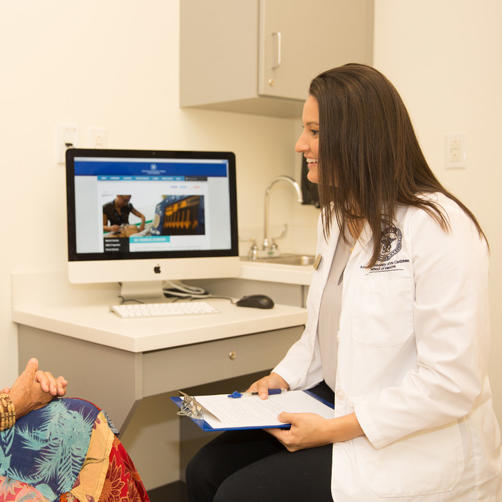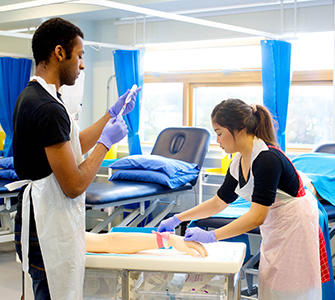As you apply to medical school or approach your graduation as a medical doctor, an important decision that will affect the rest of your career is the medical specialty that you choose. One of the most common questions someone who is planning on becoming a doctor has is, “What medical specialty should I choose?”
There is no magic formula for how to choose a medical specialty, and while there are many different factors to consider, ultimately, choosing a medical specialty will depend on your unique background and goals. This guide to choosing a medical specialty will walk you through the many factors that most medical students consider when evaluating how to decide on a medical specialty, but only you can decide which factors matter most to your unique aspirations.
TIPS FOR CHOOSING A MEDICAL SPECIALTY
When evaluating how to choose a medical specialty there are several tips that may be helpful to consider. These tips can assist you as you evaluate your options and better prepare you for this important decision.
CONSIDER YOUR LONG-TERM GOALS
It can sometimes be tempting to evaluate the decision of which specialty to pursue based on where you are now in life. But keep in mind that you likely have decades of practice ahead of you, in which you may raise a family, move to a different location, or encounter changes in practice. Considering your long-term goals will help you to better evaluate the potential impact of your decision.
TALK TO EXPERIENCED DOCTORS
It can be easy to romanticize a particular idea of your future in a particular specialty and to accidentally overlook significant considerations. Speaking to someone with actual experience in the specialty will help you to better understand the pros and cons of that specialty and will likely give perspective to aspects of your decision that you had not considered.
KEEP AN OPEN MIND
Some specialties may not sound exciting initially, but there is a reason that hundreds or thousands of doctors have chosen them. Especially if you are just starting medical school, you should keep an open mind with each specialty and consider if it is something that you could see yourself doing. Many medical students change their minds about what specialty they will pursue during medical school, and you may, too.
KNOW WHAT MATTERS MOST TO YOU
Most medical students have something that inspired them to become a doctor in the first place. Whether it is a need you saw and wanted to fill or a healthcare professional that affected your life, it is important to remember what inspired you to become a doctor. Connect with your inspiration and keep your ultimate goal for becoming a doctor in mind when choosing your medical specialty.
CHOOSING THE BEST MEDICAL SPECIALTY FOR YOU
An academic adviser will tell you that five different medical students could ask them, “What medical specialty should I choose?”, and their guidance would be different for each student. Some may think it is best to go with one of the most in-demand medical specialties, but that’s not always the smartest choice. Choosing a medical specialty depends on a variety of different factors that will be different for each medical student, but there are several considerations that will be important in most situations.
YOUR PERSONAL HISTORY
A medical student who was born with a congenital heart condition will have a very different view of healthcare than a student who spent a year volunteering in a third world country. Both experiences would have a significant impact on the lives and viewpoints of the respective medical students, but in a very different way.
Experiences and backgrounds vary significantly between individuals, and your personal history is unique to you. The different facets of your life will ultimately influence your reasons for choosing to become a physician and your goals once you graduate medical school. Considering what motivates you and what you hope to achieve with your medical career is crucial.
YOUR EXPERIENCES DURING ROTATIONS
One goal of medical school is to expose you to as many different clinical situations as possible. You should be as involved as possible during your rotations and try to understand as many of the nuances of each specialty as possible. Your experiences during your rotations will help you to understand what specialties you have an interest in and which you do not.
YOUR CLINICAL INTERESTS
You will find as you progress through medical school that some areas of medicine come very easy to you, even though they seem like a struggle to others, while other areas are not as intuitive. Finding what areas of clinical practice interest you and compel you to learn more will help you to understand which medical specialties you may be particularly suited for.
YOUR TRAINING’S DURATION
Becoming a brain surgeon takes several years longer than becoming a family practitioner. For some, the extra time and effort will be worth it, while others may want to start practicing on their own as soon as possible. The duration of your training will be a significant consideration for some, while others will not find it as large of a factor in their decision-making process.
YOUR FINANCIAL GOALS
The compensation that physicians receive varies greatly depending on the specialty that they choose. While most medical students aren’t becoming doctors solely for the financial rewards this career provides, finances often play a significant role in the decision-making process for many students. Balancing your financial goals along with the other factors will be important to many students when choosing a medical specialty.
YOUR LIFESTYLE GOALS
Different specialties will vary significantly in how they affect your lifestyle. Some specialties may require you to be on call, ready to get up at two in the morning and perform a twelve-hour emergency surgery. Others may follow relatively normal work hours. Some specialties are shift based, while others are not.
In addition to the time commitments that different specialties entail, there are also differences in the level of stress and emotional burnout that specialties will create. A neonatologist who constantly cares for critically ill babies will have different emotional stresses than an average dermatologist will. Considering the stresses that a specialty creates is an important factor when considering the impact it will have on your lifestyle.
SUCCEEDING IN YOUR RESIDENCY
Medical school is an important step towards becoming a doctor, but successfully completing your residency will be your final hurdle to becoming an independent practitioner. Preparing for your residency during medical school is important, and choosing a medical school that is supportive of the residency process is essential.
Now that you know how to choose a medical specialty, you are one step closer to embarking on your path to becoming a doctor. American University of the Caribbean School of Medicine (AUC), is committed to helping students achieve success following their graduation. We invite you to learn more about the advantages that our medical school offers aspiring physicians. Apply to AUC here.
Related Resources:




